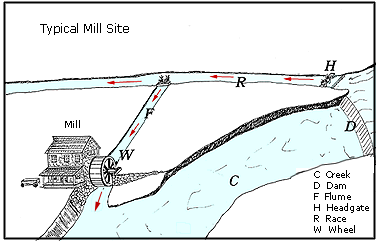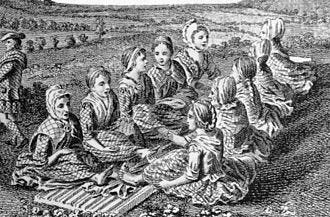Before Shawsheen Village Frye Village Stories: digging into how the “stocks” get their name
After last week's story, two readers sent me suggestions for the origin of the term “stocks” related to the 19th century Frye Village laundry. Both have real possibilities given that the technology relates directly to mills.
“It’s just a guess, but I think that the term “stock” may be related to penstock. It may be that during certain hours, water flowing normally in the mill power system was diverted to flow through some type of turbine that moved paddles for washing clothing. In this case, the water may have been both the source of power and the laundry medium.”
Other words for penstock are “flume” and “sluice.”
Typical Mill Site, Robert Howard and Thomas Sweeny III. From "Waterpower, How It Works," by Robert A. Howard, Eleutherian Mills Hagley Foundation, Inc., Greenville, Delaware, 1979
What is a "penstock?"
(A)typical mill...consists of a water wheel erected besides or beneath a mill structure; a dam at some suitable point up stream...a canal called a millrace....to carry the water to the mill with minimal loss of fall; a pen stock, or sluice, with gate, to convey the water to the wheel; and a tail race to carry the water discharged from the wheel...back to the stream below the mill.
Another reader turned to the Oxford English Dictionary.
“See #22 In a fulling-mill: Originally, the wooden trough or box in which the cloth is placed to be beaten by the ‘faller’ or the mallet; hence, this receptacle together with the ‘faller.' In modern use, stock is often taken to denote the ‘faller’ or mallet itself.”
“Fulling” is the process of cleaning woven woolen fabric and then beating the wet fabric to compact the fibers. Over time, fulling tools evolved from the fuller’s feet to clubs to fulling mills. In a fulling mill, the wet fabric is placed in a trough. The mill's water wheel turns mallets that pound the fabric.
I found an unpleasant third definition that the liquid in the trough was known as the “stocks.” Fermented urine was commonly used, as one reference described it, “the fulling liquor.”
Detail of engraving showing Scotswomen singing a waulking song while walking or fulling cloth, 1772 (from Pennant's Tour).
So we have three possibilities for the origin of "laundry stocks"
The flume or sluice that fed water to the mill’s water wheel
The trough or mallets used to compact or "full" woven woolen cloth
The liquid or “liquor” used in the fulling trough
Although none of these definitions relate directly to laundry, they all relate to mills and cloth. Try as I might, I haven’t been able to find any other references to the use of the term “laundry stocks" outside Andover.
It could be that bundling all three definitions together into “stocks” to describe the neighborhood laundry was simply local slang or vernacular.
"Laundry stocks" has not turned up in any of the dictionaries of American slang that I looked up. Which led me to wonder if there are other sayings and terms that are unique to Andover.
Have you taken one of the quizzes where you try to guess where people grew up based on the regional slang they use? My family is from upstate New York where they drink “pop” not “soda.” In school did you take a sip from the drinking fountain, water fountain, or bubbler? Do you call your workout shoes sneakers, gym shoes, tennis shoes, or running shoes?







